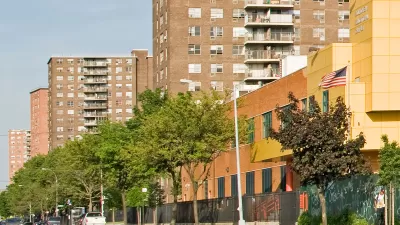United States
The Tax Foundation's Take on Mileage-Based User Fees
An economist from the Tax Foundation spoke to advocates of a mileage-based user fees. First surprise, he calls it a tax, not a fee. He appears to favor the MBUF over the gas tax, but notes its problems.
Roadway Interchange or Celtic Knot?
Pop quiz hotshot: Think you can tell the difference between a roadway interchange and a Celtic Knot?
'Gentrification' Redux: Wealth, Opportunity, Community
Ben Brown wades into the wealth/income inequity morass to make a pitch for getting beyond "gentrification" squabbles and on to wealth-building strategies for the bottom 90 percent.
Debating the Costs and Benefits of Airbnb's Short-Term Rentals
A labor group is taking on the impact of short-term rentals on the housing market in one of the most expensive cities in the country. The debate is contentious, with numbers flying both ways, and also critical for the economic health of cities.

On the Limitations of Density
Writing for FastCo.Design, Architecture Critic Inga Saffron provides a cautionary tale about density done poorly.

On the Psychology of Road Rage
Few of us are fully immune from the effects of road rage. Psychologists are asking why driving can provoke changes in behavior—and how to avert them.

How Drones Can Improve Planning and Design
In February, the Federal Aviation Administration released rules for the commercial operation of drones that were (to many observers) surprisingly business friendly. A landscape architect imagines the potential of drones for planning and design.
Implementing Housing Vouchers for Veterans
A look at what HUD-VASH supportive housing vouchers can do, from the perspective of one of the agencies administering them.
Obituary: Michael Graves, Leading Post-Modern Architect
Michael Graves, founding principal of Michael Graves & Associates, who produced some of the world's most recognizable examples of post-modern architecture, passed away this week at 80 years old.
Where Have All the Oil Trains in California Gone?
While many California were protesting oil trains carrying the hazardous Bakken crude, a funny thing happened—they stopped coming. While protests may have delayed the construction of new oil terminals, economics is at the root of the slowdown.
Places Journal Launches New Tool for Public Scholarship
Places Journal has just launched Reading Lists: a new, interactive tool that enables readers to create and share topical lists of articles, books, and other media from diverse sources.
Friday Funny: Your Subway Train Says a Lot About You
Clickhole, the Buzzfeed-style spinoff of The Onion, has produced a listicle of what the New York Subway line you're riding says about your personality. Prepare to learn nothing and laugh a little.
Obama Administration Would End Tax-Exempt Bonds for Sports Stadiums
Ending the use of tax-exempt bonds to finance the construction of pro sports facilities has high level support from President Obama's 2016 draft budget, but it's too early to tell if the proposed ban on such financing mechanisms will be approved.
200 Years of Faster Travel Times
A post on Vox collects a series of maps from the "Atlas of the Historical Geography of the United States" showing how travel times changed over the past 200 years of U.S. history.
Who Will Win the Carbon Neutral Economy?
The fossil fuel industry has convinced the public that aggressive carbon reduction will harm the economy. Au contraire. The carbon reduction leader will secure its place at the top of the global economy, argues UrbDeZine Editor Bill Adams.
Crude-by-Rail's New Workhorse No Better than the Old Workhorse
The new oil tank cars were supposed to be key to preventing the fiery explosions associated with oil-train derailments. However, four recent explosions since Feb. 14, with two occurring last Thursday and Saturday, all involved the new tankers.

How a Philadelphia Mayoral Candidate Influenced U.S. Public Housing
Former HUD counsel and current Philadelphia mayoral contender Nelson Diaz laid the groundwork for "entrepreneurial" approaches to public housing. Whether the resulting projects were effective is up for debate.
Report: 10.8 Billion Americans Rode Transit in 2014
The American Public Transportation Association (APTA) has released its annual report on public transit ridership. Although more Americans are taking public transit, the trend doesn't hold in every city.
Do Driverless Car Safety Features Merit Fuel Efficiency Credit?
Manufacturers say yes, arguing that the reduction in vehicle crashes decreases traffic congestion. Other features improve traffic flow. But these are safety technologies, not emission-reducing measures, that critics worry will water-down CAFE.

How Driverless Cars Could Affect Suburban Land Use
Successful driverless cars might lead to "mini mass transit," a distinct mode from public transit and the private automobile. The consequences for land use could reshape suburbia.
Pagination
Urban Design for Planners 1: Software Tools
This six-course series explores essential urban design concepts using open source software and equips planners with the tools they need to participate fully in the urban design process.
Planning for Universal Design
Learn the tools for implementing Universal Design in planning regulations.
planning NEXT
Appalachian Highlands Housing Partners
Mpact (founded as Rail~Volution)
City of Camden Redevelopment Agency
City of Astoria
City of Portland
City of Laramie


































